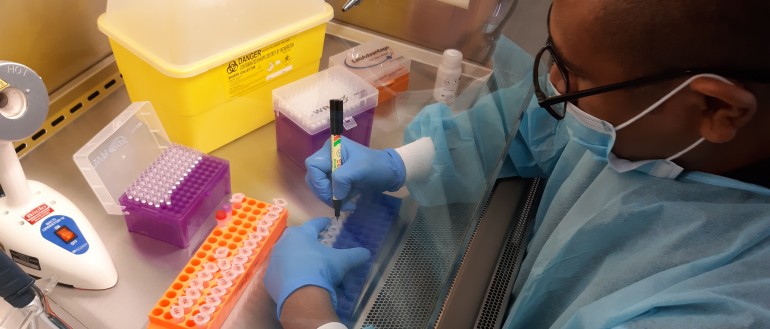Ismael Barreto is currently working with Menzies as a technical advisor for the COVID-19 laboratory response in Timor-Leste. The Timor-Leste National Health Laboratory (NHL) has scaled up testing capability to conduct in-country testing in Timor-Leste – no small feat for the island nation.
Ismael was studying a Master in International Health Policy at London School of Economics when the COVID-19 pandemic began. Ismael, who was the Executive Director of NHL before starting his studies, started getting WhatsApp messages from colleagues in Timor-Leste, including Menzies, the World Health Organisation (WHO) and the NHL about how to set up the necessary testing in Timor-Leste.
As the pandemic worsened in the United Kingdom and courses moved online, Ismael made the decision to return to Timor-Leste and became an integral part of the country’s response. He recently spoke to us about his decision and his role in Timor-Leste’s COVID-19 response.
Before returning to Timor-Leste, you were studying a Master’s degree at the London School of Economics. Why did you decide to return to Timor-Leste?
After seeing how countries with very strong public health systems such as the United Kingdom failed to contain the virus; I thought about the safety of my family and how Timor-Leste would be devastated by the COVID-19 pandemic; given the limited resources we have. A few days after the London School of Economics announced that all learning modules and exams would be delivered online; I thought about returning to Timor-Leste. I then received a text from Dr Joshua Francis (a Menzies Senior Research Fellow and co-lead Timor-Leste projects) who was in Timor- Leste, asking whether I could come back and work at the lab. I said “Yes” straight away.
How has the NHL responded to the COVID-19 response?
The NHL has been doing real-time PCR (polymerase chain reaction) testing for influenza for the last three years; so it was in a strong position to introduce real-time PCR testing for COVID-19. There are lab staff with really good technical skills, however without the support from Menzies and the WHO to provide technical advice, biosafety maintenance, confirmation testing at the Royal Darwin Hospital during the initial phase of testing, and the continuous supply of test kits and consumables, we would not have been able to have COVID-19 testing done here in Timor-Leste.
Timor-Leste currently has a low number of cases, why do you think the numbers have remained low?
I think the rapid decision to quarantine those returning from overseas was one of the most crucial measures to contain the virus, followed by good coordination between all the pillars and partners involved; and certainly; surveillance and the laboratory have a very important role.
Do you think there need to be more sentinel surveillance tests done? If yes, why?
Yes. This should be the new normal, having samples continuously collected and tested; to ensure early detection and rapid response.
What are some of the key advantages of having Menzies researchers assisting in Timor-Leste?
We fight against a novel virus that still little is known about. Without basing decisions on scientific evidence; the impact would be huge. Menzies has been working with the Ministry of Health to strengthen surveillance and diagnostic capacity for infectious diseases, and the COVID-19 pandemic is a real-time test on whether what has been done works. We have the local capacity to test for the virus. That is a significant advantage on the fight against COVID-19; which for some developing countries would be a luxury.
What is your daily routine at the moment?
My daily routine at the moment is being at the lab during the day to ensure testing for SARS COV 2 (COVID-19) is done uninterruptedly with high quality; while as a student I always fill my spare time doing school work.
What do you do to relax/unwind?
Not much time to relax at the moment, but spending time with my family helps me relax. And Mike’s Chicken. It’s delicious.

